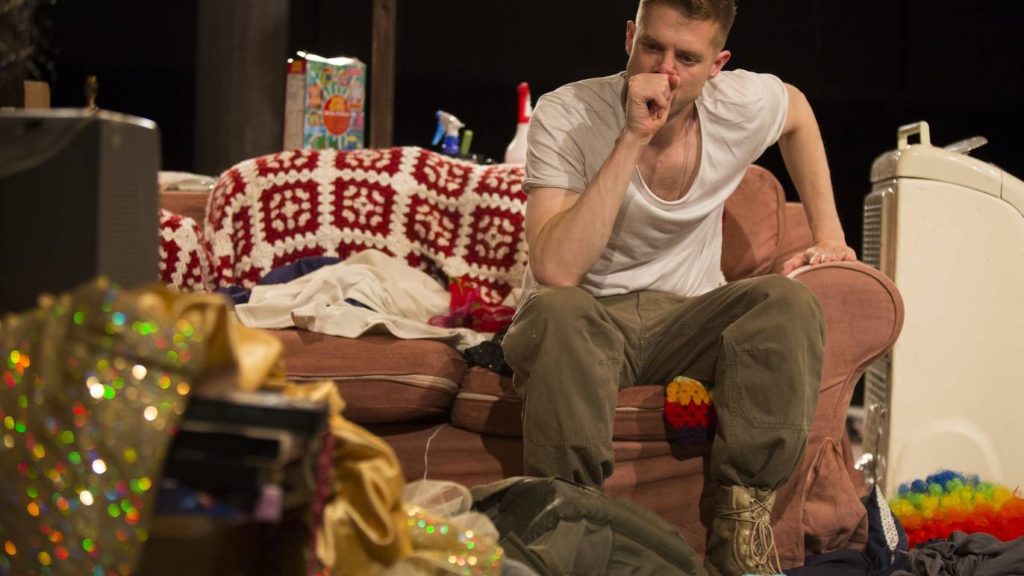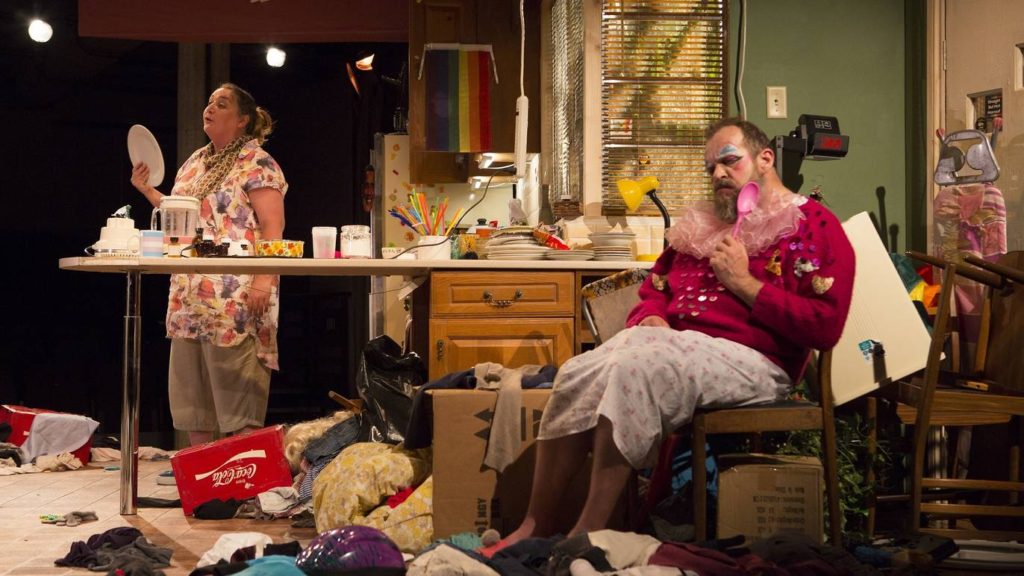‘No good ever came from things.’ This line from Hir by Taylor Mac is guaranteed to strike fear into propwatchers. For what is this series but an act of devotion to the innate goodness of things, to the conviction that you can crack open a production via the portable stuff on stage?
A prop is where stage illusion meets the material world. However fantastical the production, a prop – a real object you can grasp in your hand – anchors you to the observable world beyond. Even the humblest pot, glass, dummy or watch arrives with its own spectrum of meanings which give it solidity, informing or arguing with the performance around it.
There’s an embarrassment of props in Hir: a whole disordered spill of them. What to select: the air conditioning unit or the blender? Clown wig or cleaning products? Or the flotsam of discarded clothes fringing the stage? Mac writes an American domestic drama, but simultaneously explodes the idea of home, family and America. The objects that freight the living room make what we watch seem deceptively real – yet Mac reminds us that this was never real in the first place, but as much a cultural construct as everything else in the theatre. A functioning stage kitchen looks solid but may be artificial. Patriarchy and heterosexuality too.
The family in Hir was once archetypal – pop and mom, brother and sis. Pop worked, mom kept house, kids kept quiet. Pop was abusive, everyone else was abused. Things have changed. Arnold lost his job and his health; since his stroke his wife Paige and their daughter Maxine – now their transitioning son, Max – have crawled out from under his forbidding rock, and remade themselves as cultural contrarians and genderquake warriors, building new, fluid identities for themselves. When brother Isaac comes home from Afghanistan (no conquering hero, but discharged after a humiliating drugs bust), he’s appalled – he recognises how awful their father was, but doesn’t know any other way to be a man. He tellingly goes by the nickname ‘I’, but the unquestioned I isn’t a useful pronoun any more.
Mess is where revolution begins
Nadia Fall’s tense production occupies a raised traverse stage. We watch from both sides (never losing sight of the other half of the audience), and Ben Stones’ design is thus both hyperreal, with its working taps and appliances, and hyperstrange, a gallery exhibit of domus americanus. Paige and Max visit the museum each week for Culture Saturday – well, this is our culture Saturday, observing a blue collar family before and after, displayed with all their junk. Paige’s rebellion against her cowed past means no cleaning, no tidying: hence all the clothes and other clutter left where it fell. If housework was a means of denying women time to think for themselves, mess is where revolution begins.
Isaac’s army job was also about clearing up mess. He was in the mortuary corps, charged with collecting human detritus: a horrible job that has left him retching with some kind of PTSD, but Paige refuses his argument that it was an act of compassion for the families of the dead. Paige also refuses to care for Arnold except in the most cursory fashion – whizzing up his medication with extra unprescribed oestrogen to keep him docile, leaving him alone while she’s at work, squirting him with water like a badly behaved pet. It’s this lack of care that Alice Saville’s review finds troubling – ‘her present, visible violence easily outweighs his past sins.’ Calculating how much care our previous actions merit or negate isn’t an easy equation; what’s stark is how Paige, so long confined to supporting the husband who belittled, beat and raped her, won’t care. Yet she doesn’t abandon him – she may be his caregiver long after the play ends.
Several reviewers have described the play as satire, which feels off. It’s more like reportage: not because the average household encompasses all these post-patriarchal issues, but because redefining home and family, self and obligation seem a moving, crucial and contemporary process. Mac flings a handful of cards on the table and even more in the air; Paige’s dauntless opening speeches (delivered with breezy assurance by Ashley McGuire) telling Isaac what has been going down in his absence would be where other plays end rather than begin.
Furious and disenfranchised, Arnold would be one of Donald Trump’s troopers if he were well, but things are no longer that simple. The family’s home sits on landfill: the foundations of the trad family are so much junk. All Isaac can do is try to tidy it back into the cupboards, while Max, exploring a spectrum of identity from anarchist fairy to snarling ape, leaves it behind. As the children, Arthur Darvill and Griffyn Gilligan are memorably bruised and rangy, defiant and vulnerable, lost boys in wife beaters. Home and family are, like the floor itself, patched together with gaffer tape; Paige’s refusal to nurture represents another cultural totem hurled on the junkheap. It’s all stuff. Finding the stuff that helps, the stuff we need – there’s the task for the 21st century family.
Follow David on Twitter – @mrdavidjays



Leave a Reply